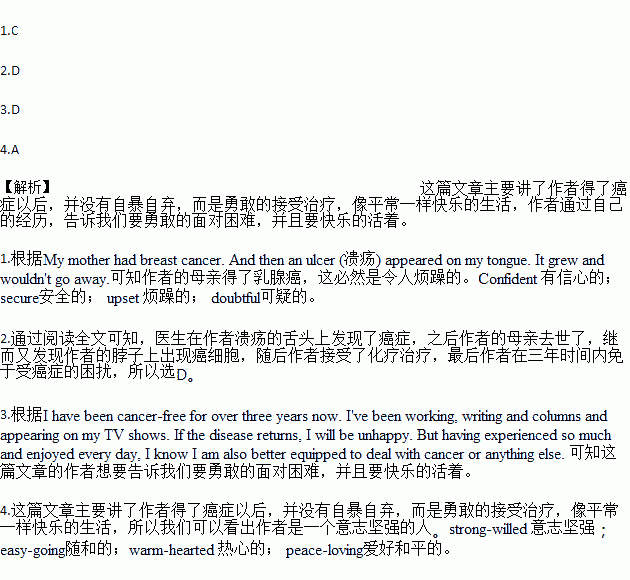题目内容
By May, 2012, my family was already distressed. My mother had breast cancer. And then an ulcer (溃疡) appeared on my tongue. It grew and wouldn't go away. My doctor suggested a physical examination and it was early June when I collected the reports.
“Your doctor will discuss the report with you, sir,” the nurse told me.
“You can tell me,” I said. “I can deal with it. My mother has cancer.”
“It's cancer. ”
The result hit me, and I had to idea how my life and I were about to change.
I shared the news with my family. I couldn't help crying. I thought about what I needed to do for my family and the everyday things as well. What was going to happen to my newspaper column(栏目)?I e-mailed the concerned editor about my situation. I also sent her a few columns to run while I was in treatment.
Two days later I had an operation, and I recovered quickly, but Mummy passed away soon. Except for the regular check-ups, life returned to normal. But a few months on, my doctor found cancer in my neck!
“What are my chances of survival?” I asked.
“Pick any number between one and hundred, ”the doctor replied.
I had another operation. This time my doctor said I also needed radiation therapy(化疗), which is very hard on a patient with cancer. But I was again not going to allow cancer to disturb my job and life.
I have been cancer-free for over three years now. I've been working, writing and columns and appearing on my TV shows. If the disease returns, I will be unhappy. But having experienced so much and enjoyed every day, I know I am also better equipped to deal with cancer or anything else.
1.The underlined word “distressed” in the 1st paragraph means .
A. Confident B. secure
C. upset D. doubtful
2.Which is correct order according to the story ?
a. Cancer was found in my neck.
b. I had an operation along with radiation therapy.
c. I have been free of cancer for three years.
d. Cancer was found in an ulcer on my tongue.
e. My mom passed away.
A. d - b - a - e - c B. e -a - c - d - b
C. e -d - a - b - c D. d - e - a - b – c
3.The author intends to tell us to .
A. put work in the first place B. kill cancer with operations
C. get along well with all family D. face difficulties and live bravely
4.Which of the following words best describes the author?
A. strong-willed B. easy-going
C. warm-hearted D. peace-loving
 单元全能练考卷系列答案
单元全能练考卷系列答案 新黄冈兵法密卷系列答案
新黄冈兵法密卷系列答案调查表明,有许多青少年有不吃早餐的习惯。请根据表格内容用英语写一篇短文。
原因 | 晚上学习太晚,早上起得迟;用吃早餐的钱去上网玩游戏;一些女孩为保持苗条身材常不吃早餐。 |
结果 | 不利于身体健康;上课时想睡觉;影响记忆力和学习成绩。 |
建议 | 早餐不可少,它能提供全天所需能量的30%。青少年健康应从早餐开始。 |
注意:1.不要逐条翻译,可适当增加情节,使内容连贯。
2.词数100左右;
3.参考词汇:苗条的:slim能量:energy。
A survey shows that many students do not have breakfast.________________________________________
____________________________________________________________________________________________
____________________________________________________________________________________________
____________________________________________________________________________________________
____________________________________________________________________________________________
____________________________________________________________________________________________
____________________________________________________________________________________________
____________________________________________________________________________________________
______________________________________________________

